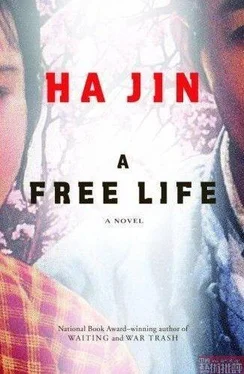That night he called his wife and told her what he had seen and heard. Pingping was so impressed that she urged him to clinch the deal with Mr. Wang the next day, paying a deposit that should be less than twenty percent of the agreed price. Also, she warned him not to haggle too much. One or two thousand dollars wouldn't make much difference as long as the business was solid.
Before hanging up, she said in English, "I miss you, I love you, Nan!" Somehow her words sounded more natural from a thousand miles away. He hadn't heard her speak to him so passionately for a long time.
"I love you too." Despite saying that, he wasn't sure of his emotions. He still didn't have intense feelings for her, but he felt attached to her and understood that they had become more or less insep-arable-neither of them could have survived without the other in this land, and more important, their child needed them. If they moved to Georgia, it would mean they'd have to live more like husband and wife from now on. In a sense he wasn't displeased with that prospect, since whenever he was with Pingping, he felt at peace. Still, these days his thoughts had often turned to Beina, who seemed to accompany him wherever he went, enticing him into reveries. When he closed his eyes at night, her vivacious face often emerged, as if she were teasing him or eager to talk with him. Then he'd again smell the grassy scent of her hair. If only he could love Pingping similarly so that she could replace that woman in his mind, who was, he knew, merely a flighty coquette.
Late the next morning, toward eleven, he went to the Gold Wok again, but he didn't immediately go in. He parked a short distance from the restaurant and stayed in the car, waiting to see how many customers would appear. It was drizzling, the powdery rain blurring the windshield. It wasn't hot, so he didn't mind staying in the parking lot for a while, listening to a preacher on the radio. The man was speaking about a verse from Matthew, expounding on the necessity of "fresh wineskins for new wine." Nan was fascinated by his eloquence and passion despite the man's oddly hoarse, croaking voice. Meanwhile, in less than half an hour, five people turned up at the Gold Wok, three of whom appeared to be Mexican workers from the construction site nearby. They looked like regulars, and when they came out, they each held a tall cup of soft drink besides the food in Styrofoam boxes.
When Nan told the Wangs that he wanted to buy the restaurant, they looked relieved. Then began the bargaining. Nan managed to beat down the price by $3,000 on the grounds that he didn't like the horse murals and the Formica tables in the booths. This was the first time in his life that he had ever haggled with someone, and he took great pride in the result, feeling like a real businessman. The amount he'd saved translated into 25,000 yuan, thirty times more than his annual salary back in China. Somehow, whenever Nan handled a large sum of money, he couldn't help but convert dollars into yuan in his mind, and the habit made him very frugal. At times, though, he wished he could grow out of this mind-set, because he believed that here people got rich not just by how much they saved, but more important, by how much they made, and that in America one should live like an American.
" When will you come and take over?" Mr. Wang asked Nan with a little chuckle.
"Probably in a month or so."
"Too long. How about two weeks?"
"I'll try. It shouldn't be a big problem. I'll let you know soon after I get home."
Nan wrote him a check for $2,200, a ten percent deposit. The Wangs asked that he keep Tammie, who had been working for them since her late teens, almost a decade by now. "That's fine," Nan promised. He was going to need help anyway. Currently they paid her one dollar an hour because she kept all the tips.
That afternoon Nan hit the interstate, heading back north.
HE RETURNED to Woodland two days later. Pingping was overjoyed to hear about the restaurant and the Atlanta suburbs. They were both pleased to know Mr. Wang was from Taiwan, for generally speaking, the Taiwanese were more trustworthy than the main-landers, who often ignored rules and laws. The Wus knew some people who'd been swindled even by their fellow townsmen from the mainland.
One thing Nan and Pingping had forgotten to consider was where to live. Nan had noticed some apartment buildings in Norcross, a neighboring town north of Lilburn, but he hadn't brought back any information on housing. So the following day he called the Gold Wok and asked Mrs. Wang about affordable housing in the vicinity. The old woman said she was going to mail Nan an apartment book. " There are some copies outside. They just arrived," she told him.
He remembered seeing a red wire rack beside the entrance to the restaurant that held several kinds of booklets and leaflets. "Can you send it along right away?" he asked.
"I'm going to do it today."
Everything seemed to have fallen in place, and the Wus began planning to move. Even Taotao had to decide what toys and books to take and what to donate to the thrift shop behind the town library, run by the Unitarian church.
The main difficulty was Nan 's books, most of which were in the boxes stored in the small shed attached to Heidi's garage. Years ago when Nan still planned to return to China, he had collected more than forty boxes of used books, determined to establish his own library once he went back. But when they had come to stay with the Masefields, Nan had had to leave the books behind in Watertown. He'd talked his landlord, Mr. Verdolino, into renting him a basement room for sixty-five dollars a month and had kept his three thousand volumes there for two years. Later he realized that the amount he paid for the rent would eventually buy him those books again. Ping-ping urged him to get rid of them, since he couldn't go back to China anymore. Nan took some boxes of the books to local libraries and bookstores, but no one wanted them, all telling him that the titles were too specialized. Indeed, who among general readers could use a book like Anna Akhmatova's Complete Poems in the Russian or Hans Morgenthau's Politics Among Nations? Heartbroken and having nowhere to send the books, Nan had just left the few boxes next to a bunch of trash cans on a sidewalk lined with dirty snowbanks. The following week he threw away another three boxes.
For a month afterward he felt miserable, almost ill. If only there were a way to keep those books. Try as he might, he couldn't steel himself to dump them all. Fortunately, a friend of his who was returning to China came and picked thirteen boxes from his collection. Nan helped her pack them up and even drove a van with her all the way to New Jersey to have them shipped to Tianjin City by sea. Then he persuaded Heidi to let him use a little space in her shed in which to store the remaining eleven boxes. Now, to save postage, he would have to get rid of some of them again. In America every town had a library; why should he keep hundreds of titles at home? After carefully going through them, he kept about two thirds of the books, seven boxes in all, and discarded the rest.
Everything else was easy to pack; the Wus didn't have many belongings. Pingping phoned Heidi, who was on Cape Cod with her children, to let her know of their imminent move. Heidi sounded excited and also relieved. Two days later she returned to Woodland. She gave Pingping $1,200 to buy mattresses-twelve one-hundred-dollar bills in an envelope-since the Wus couldn't take along the ones they had. She also told her to clean their attic apartment before they left. Livia had come back with her mother too, and on the way she'd bought Taotao a Rubik's Cube. Now, as the adults were talking, the girl and the boy were in the living room, Livia showing him how to work the puzzle. The girl had an appointment with her orthodontist at eleven a.m. to adjust her braces, so a few minutes later Heidi called her out, ready to go.
Читать дальше












